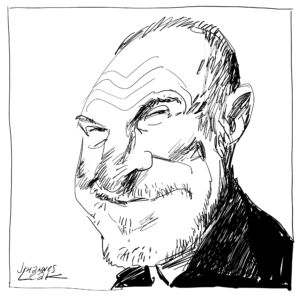The making of Dylan Mulvaney
We know this is a performance – so why do we have to play along with it?

Two ostensibly very different men attracted a lot of attention this week. Two American personae, or masks. Two cracked mirrors, reflecting our 21st-century schizoid age. The mirrors in question are the painfully thin TikTok influencer Dylan Mulvaney – thin as only gruel can be thin – and the would-be firebrand Justin J Pearson, member of the Tennessee House of Representatives.
Mulvaney (and if you have managed to avoid him heretofore, do consider logging off now before the barbs of scandalised delight pierce the skin) is the current poster person for the hotly contested lavatory stall of trans rights. He first minced into the public consciousness as little as a year ago with a series of home movies updating us on his transition to life ‘as a girl’. His mask is a sort of travesty on this. He channels an idealised 1950s Doris Day innocence.
On his first day of ‘girlhood’, he addresses the camera with his ticked boxes so far: ‘I’ve already cried three times, written a scathing email I didn’t send, ordered dresses online that I couldn’t afford and when someone asked me how I was, I said “I’m fine”, but I wasn’t fine. How did I do, ladies?’
In perhaps the most notorious of his follow-ups, he visits the countryside, in heels, and is menaced by a bug of some kind. It is as broad and grotesque a parody of archaic feminine instability as has been seen since Dick Emery’s prime.
It’s patronising, of course, but harmless enough, you might think, as juvenile parody. No worse than my daughter putting on my slippers, and marching around the house with a power drill and a mug of tea booming ‘I’m a Dad!’.
But it’s not just pantomime, of course. In the characteristically joyless mode of the current discourse, this is not to be seen as an act, at all. It is a ‘lived reality’, as sacrosanct and worthy of respect as was the human dignity of John Merrick, the Elephant Man.
And just in case you doubt the implied religious taint, Drew Barrymore, herself once the Agnus Dei of exploited Hollywood girlhood, recently got down on her knees before Dylan, like Christ about to anoint his size-10 feet. Meanwhile, his little 90-second e-spurts have earned him lucrative sponsorship deals, promoting women’s sportswear, tampons and other feminine products – a development which some human beings, for whom a sports bra performs a more than purely symbolic role, find provocative.
Justin Pearson, by comparison, is a model of decorum and self-restraint. He is a young, black lawmaker, a member of the of the Tennessee House of Representatives. He was expelled last week and swiftly reinstated this week for joining an anti-gun protest outside this chamber, in a manner that some older, more conservative members felt was unseemly.
Pearson went viral with one of his speeches. And his schtick is, in its own way, every bit as performative and as much of a throwback as Mulvaney’s. It is this which has drawn the world’s attention to an otherwise local kerfuffle.
Pearson has developed a rhetorical style that seems to be almost comically informed by the archetypal Southern preachers of the civil-rights era. He comes across like a character in a Spike Lee movie, channelling the ‘dare you to notice’ energy of a Don King as much as the deadly seriousness of the likes of MLK and Malcolm X.
These two mirrors have clashed with the two iron laws of the internet, both of which are opposed to each other. Law No1 – the internet is forever. Law No2 – whatever doesn’t fit the narrative, can be safely disregarded. And this is where humanity’s endless capacity for adaptation has stepped in, to escape being crushed between these two irreconcilable forces.
The internet proved its eternal presence by gifting us unpasteurised, unfiltered video evidence of the artifice of these two performances. Yet this has been waved away by the faithful as confidently as if they were deep fakes or some other AI artefacts of our post-post-postmodern world.
In one video, an immaculately attired and beautifully spoken Pearson is seen a mere seven years ago, appearing smooth, plausible and reassuringly centrist in a campaign video. This persona is strikingly at odds with the one he has adopted at the Tennessee House of Representatives. He made Barack Obama look ham.
In the other video, Mulvaney is explicit in his acknowledgement that he is trying out a new ‘femme’ persona in order to attract more attention and acting work. This was unearthed – to my eyes at least – in a wonderfully ferocious denunciation of Mulvaney’s malarkey by Jean Hatchet in the Critic.
What I find fascinating is how little impact these revelations will have on those who are invested. Sceptics will assume this is an end to the matter, a slam-dunk. But they underestimate our capacity to wilfully overlook the naked artifice of a shtick that fits our Weltanschauung, so to speak.
It’s as if our culture is developing anterograde amnesia – the inability to form new memories. This rare condition, explored brilliantly in Christopher Nolan’s first full-budget movie, Memento, appears to be the only mode in which we can survive in the modern world with our beliefs and loyalties intact. This seems to be how we have decided to resolve the unbearable tension between the two iron laws. If the internet insists on remembering forever, we will just have to downgrade our own memory spans accordingly.
We seem ever more capable of being ‘reminded’ of the rise of fascism in the 1930s, despite not having been so much as a twinkle in the Führer’s eyes at the time. Yet we are utterly incapable of retaining for more than five minutes things that have happened in front of our eyes – the certain, unambiguous declaration of intent that so often precedes the emergence of these cargo-cult personalities. Instead we demand they be taken seriously, even as they spark and glitch like cheap, soon-to-be-recalled toys. Their very presence on our collective screens alone seems to insist on their legitimacy.
Who knows? Perhaps Christ’s ministry itself was similarly tested, by people saying ‘Jesus? What, that Jesus? The bloke who put our shelves up?’
Ah well. I remember reading many years ago, again with scandalised delight and disbelief, that L Ron Hubbard had blithely observed that ‘Writing for a penny a word is ridiculous. If a man wants to make a million dollars, the best way would be to start his own religion.’ He then did just that, and founded the Church of Scientology. You’d think we might have learned our lesson, but clearly the species has, despite L Ron’s best efforts, failed to go clear on that front just yet.
Simon Evans is a spiked columnist and stand-up comedian.
Picture by: Getty.
To enquire about republishing spiked’s content, a right to reply or to request a correction, please contact the managing editor, Viv Regan.









Comments
Want to join the conversation?
Only spiked supporters and patrons, who donate regularly to us, can comment on our articles.